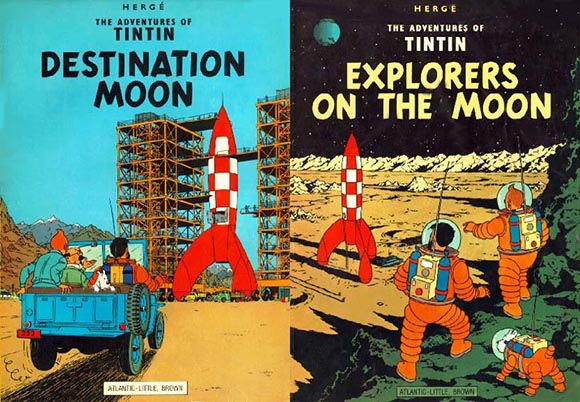 |
| The cast of The Adventures of Tintin |
H is for Hergé, but really, there’s only one thing anyone thinks of when they hear his name – Tintin.
What’s so great about Tintin? To be honest, that’s a question I’ve asked myself before, since discovering him aged 10 or 11. I loved the books back then, devouring them avidly, and I still have a huge amount of affection for them, but reading Tintin as an adult, it’s hard to pin down exactly where the appeal lies.
The books are certainly of their time – leaving aside some slightly dubious racial attitudes (even apart from the notorious Tintin in the Congo), the modern reader may be surprised to see just how much smoking and heavy drinking there is, something I can’t imagine in more modern books. And in the moon landing stories (Destination Moon, Explorers on the Moon) there’s a jarring reminder that they were written several years before the first launch of the Sputnik Programme, and are closer to Jules Verne and H.G. Wells than modern science fiction.
The characters are drawn with very broad brushes, becoming archetypes if you’re generous, stereotypes if you’re not – the brave young hero, the salty sea-dog and the brilliant but absent-minded professor are all present and correct, while the villains tend to scowl a lot, smoke cigars and regularly use chloroform to abduct people. Maybe this simple characterisation, along with the slightly “boys’ own” style, is what makes it so accessible across cultures.
While not being packed with puns in the manner of Asterix, for example, the English translations of Tintin still attempt to replicate the humour and wordplay in the originals. Dialogue gets tweaked to make convincing jokes based on Professor Calculus mishearing things, and in Tintin and the Picaros the translators, Leslie Lonsdale-Cooper and Michael Turner, take full advantage of Hergé’s invented language. The speech of the Arumbaya Indians looks foreign, but resembles appropriate English phrases when spoken aloud (e.g. “Oozfah sek 'unds” meaning “who’s for seconds?”), and their name for the pyramid, Hotwattabottl, hopefully needs no further explanation.
It’s easy to be negative about Tintin, especially in light of recent rows about racism, but the books have an enduring appeal. These ripping yarns are possibly a little dated, but they still wear the years well as an artefact of a more innocent time, when good guys wore white hats and bad guys wore black hats, smoking was a harmless pleasure, and the natural instinct of a villain was to lock you up somewhere until they’d carried out their evil scheme.
So I enjoy them for what they are - gripping adventures in a variety of settings with some truly iconic cartoon imagery, perfect escapist reading matter.


Fun! My husband also loved both Asterix and Tintin as a child (and still as an adult). I actually never heard of them at all until we got married and he shared his comics with me. Unfortunately, sharing them with 8 children over 25 years has taken their toll.
ReplyDelete(coming from Blogathon)
Wow, sounds like hard work!
DeleteI am a huge Tintin fan. I know he's not very PC, but I loved the books when I was young, and couldn't understand why my sister wasn't remotely interested in them. My boys are reading them now, and I found an old Tintin knitting pattern, so I've just started a jumper!
ReplyDeleteOh, a Tintin jumper sounds lovely - funny thing is, I did have a Tintin T-shirt, which I loved. Just wouldn't read the books. Weird child!
Delete